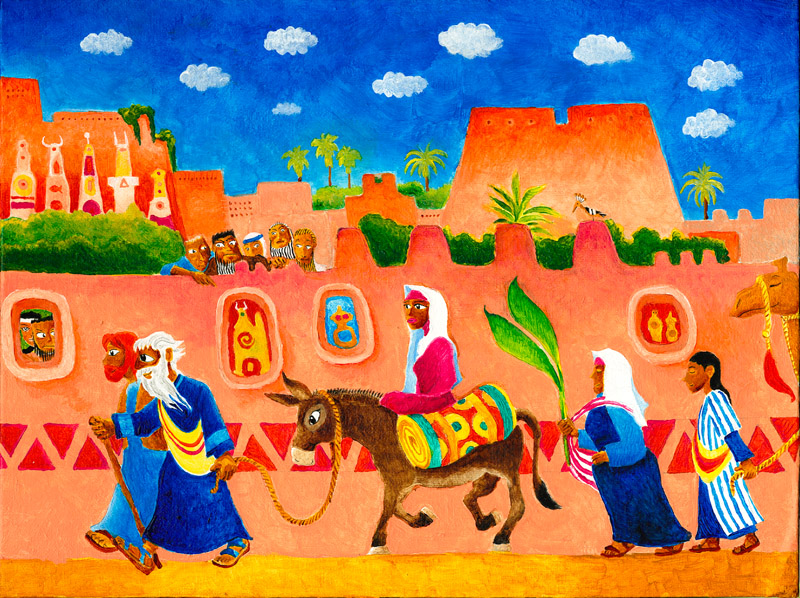Bonjour / Hello [nickname_else_first_name],
Table of contents
1) Perashat Hashavoua - Rabbi Eli Mansour
2) Halakhat Hashavoua (Halakhot related to day to day life) - Hazzan David Azerad
- Laws of Tefila -waking up in the morning (Peninei Halacha)
3) Holy Jokes!
4) FOR KIDS!

This Week's Parasha Insight with Rabbi Eli Mansour
Parashat Lech Lecha: Receiving the Power to Bless
When G-d first spoke to Abraham and commanded him to leave his homeland and move to what would become known as the Land of Israel, He made several promises, including, "Va’abarechecha Mebarecheka, U’mekelelcha A’or" – "I shall bless those who bless you, and those who curse you, I shall curse." G-d assured Abraham that those who bless him and his descendants would be blessed, and those who curse him and his descendants would be cursed.
The Or Ha’hayim Ha’kadosh (Rav Haim Ben-Attar, 1696-1743) notes the different sequences in the two parts of this phrase. When it comes to those who bless Abraham, G-d promised, "I will bless those who bless you," mentioning first His blessing, and then the blessing which people give to Abraham. But in the next part of the verse, G-d says, "those who curse you, I shall curse" – mentioning first the curse which people would try to place on Abraham, and then that G-d would curse them. What is the reason for these different sequences?
The Or Ha’hayim explains that the first phrase – "I shall bless those who bless you" – means that G-d would bless people who bless Abraham even before they actually utter the blessing, as soon as they intend to bless him. Those who curse Abraham, however, would be cursed by G-d only after they actually utter the curse. And thus G-d stated, "I shall bless those who bless you" – indicating that they will be blessed even before they pronounce their blessing to Abraham" – and "those who curse you, I shall curse" – indicating that they will be cursed only after cursing Abraham.
Why would those who bless Abraham or the Jewish People be rewarded even before they actually pronounce the blessing, whereas those who curse Abraham or his descendants are punished only after pronouncing the curse?
The Or Ha’hayim offers a number of explanations, one of which is that people need to be blessed in order to grant blessings to others. The blessings that people would confer upon Abraham or upon the Jewish Nation will not be effective unless those people have themselves been blessed. Therefore, G-d assured Abraham that He would grant blessings to all those who intend or wish to bless him or his descendants. These blessings will then grant them the power to bless Am Yisrael. This is the meaning of "Va’abarechecha Mebarecheka" – that G-d will bless those who wish to bless the Jewish People, empowering them to give us their blessing.
The more we desire to bring blessing to other people, and to the world, the more G-d blesses us with this ability. If we truly strive to bless and give to the world, then we will receive G-d’s blessings to enable us to do so.

Laws of Tefila -waking up in the morning (Peninei Halacha)
“One should gather his strength like a lion to rise in the morning to serve his Creator and to awaken the dawn” (the opening of the Shulchan Aruch, Orach Chaim 1:1).
The manner in which a person gets up in the morning indicates to a large extent his general emotional state, and influences his functioning throughout the entire day. This is the reason why praying vatikin is considered so praiseworthy – that “he should be the one who awakens the dawn” (Shulchan Aruch 1:1). Even before nature stirs and the sun rises, he gets up from his sleep and sings songs of praise before God. Although it is not the widespread custom today to get up for vatikin (see further in this book 11:5), every person must at least endeavor to rush to synagogue before the prayer service begins.
The Acharonim (commentaries from the 16th century on)write that immediately upon waking up it is good to say Modeh Ani, “I gratefully thank You, living and eternal King, for You have returned my soul with compassion. Abundant is Your faithfulness” (Seder HaYom; aYHaYMishnah Berurah 1:8). Faith gives purpose to life. If HaKadosh Baruch Hu chose to grant someone life, it means that his existence has great value. Inspired by that conviction, one can arise in the morning with enthusiasm and strength.
The Chachamim state that one must wake up like a lion because a lion symbolizes someone who loves himself, comprehends his self-worth, and can use that insight to courageously cope with all the obstacles standing in his way (see Rabbi Natan of Breslov’s Likutei Halachot on rising in the morning).
Shabbat Shalom Umevorach
David Azerad
3) HOLY JoKeS!!
Selection of funny snippets, loosely related to this weeks parashah or current events, to brighten your day



4) FOR KIDS
Click on the image to open the youtube video











